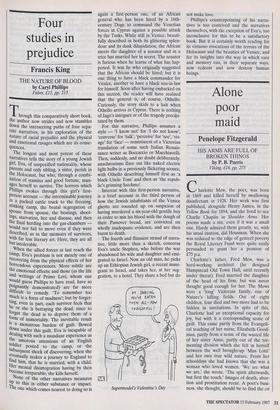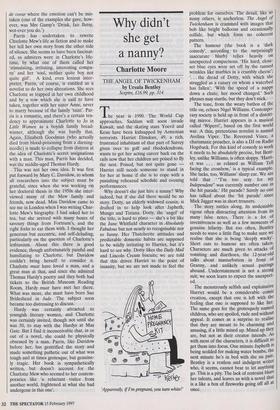Alone poor maid
Penelope Fitzgerald
HIS ARMS ARE FULL OF BROKEN THINGS by P. B. Parris Viking £16, pp. 275 Charlotte Mew, the poet, was born in 1869 and killed herself by swallowing disinfectant in 1928. Her work was first published, alongside Henry James, in the Yellow Book for 1894, and she lived to see Charlie Chaplin in Shoulder Arms. Her poems made a stir, even if it was a small one. Hardy admired them greatly, so, with his usual caution, did Housman. When she was reduced to the edge of genteel poverty the Royal Literary Fund were quite easily persuaded to grant her a pension of £75 p.a.
Charlotte's father, Fred Mew, was a hard-working architect (he designed Hampstead Old Town Hall, until recently under threat). Fred married the daughter of the head of his firm, but was never thought good enough for her. The Mews were a 'long' Victorian family, one of Nature's killing fields. Out of eight children, four died and two more had to be hidden in institutions. In spite of this, Charlotte had an exceptional capacity for joy, but with it a corresponding sense of guilt. This came partly from the Evangeli- cal teaching of her nurse, Elizabeth Good- man, partly from a sense of the wasted life of her sister Anne, partly out of the tor- menting division which she felt in herself between the well brought-up 'Miss Lotti' and her own true wild nature. From her schooldays she had known that she was a woman who loved women. 'We are what we are,' she wrote. The spirit afterwards, but first the touch.' Images of death, abor- tion and prostitution recur. A poet's busi- ness, she thought, should be to find the cti de coeur where the emotion can't be mis- taken (one of the examples she gave, how- ever, was Mrs Gamp's 'Drink, fair Betsy, wot-ever you do.') Parris has undertaken to rewrite Charlotte Mew's life as fiction and to make her tell her own story from the other side of silence. She seems to have been fascinat- ed, as admirers were in Charlotte's life- time, by what one of them called her `stimulating, irritating, interesting compa- ny' and her 'soul, neither quite boy nor quite girl'. A kind, even lenient inter- preter, Parris, of course, is entitled as a novelist to do her own alterations. She sees Charlotte as trapped in her own childhood and by a vow which she is said to have taken, together with her sister Anne, never to marry because of the family 'taint'. Par- ris is a romantic, and there's a certain ten- dency to approximate Charlotte to Jo in Little Women as a boyish family bread- winner, although she was hardly that. Again, Elizabeth Goodman (who actually died from blood-poisoning from a darning- needle) is made to collapse from distress at the idea of Charlotte's secret assignations with a man. This man, Parris has decided, was the middle-aged Thomas Hardy.
This was not her own idea. It was first put forward by Mary C. Davidow, to whom all researchers into the subject must be grateful, since when she was working on her doctoral thesis in the 1950s she inter- viewed many of the Mew family and friends, now dead. Miss Davidow came to see me in London when I was writing Char- lotte Mew's biography. I had asked her to tea, but she arrived with many boxes of savoury things from Fortnum's, and the right forks to eat them with. I thought her generous but eccentric, and self-deluding, particularly on the question of Charlotte's lesbianism. About this there is good evidence, though unfortunately painful and humiliating to Charlotte, but Davidow couldn't bring herself to consider it. Charlotte must have loved a man, and a great man at that, and since she admired Thomas Hardy's poetry and they both had tickets to the British Museum Reading Room, Hardy must have met her there. What was more, she must have been Sue Brideshead in Jude. The subject soon became too distressing to discuss.
Hardy was certainly attracted to youngish literary women, and Charlotte was certainly invited, though not until she was 50, to stay with the Hardys at Max Gate. But I find it inconceivable that, in or out of a novel, she could be physically obsessed by a man. Parris, like Davidow before her, has gentrified the story and made something pathetic out of what was tough and at times grotesque, but genuine- ly tragic. Her book is sympathetically written, but doesn't account for the Charlotte Mew who seemed to her contem- poraries like 'a reluctant visitor from another world, frightened at what she had undergone in this one'.



























































 Previous page
Previous page